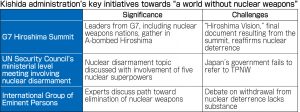One year after G7 Hiroshima Summit, “achievements” in question, Part 2: “World without nuclear weapons” a distant goal
May 20, 2024
Japan strengthens reliance on U.S.
Prime minister’s view different from that of survivors
by Fumiyasu Miyano, Staff Writer
In April, the Hiroshima Organization for Global Peace (HOPe), a private-public sector organization led by the Hiroshima Prefectural government, released the “Hiroshima Report,” an assessment of the nuclear disarmament efforts made by nations around the world in 2023. Despite the A-bombed Hiroshima City serving as host of the summit meeting of the G7 (Group of Seven industrialized nations), Japan received a lower score in the report for the first time in three years. The report pointed out that Japan has increased its reliance on expanded deterrence, including nuclear weapons, provided by the United States.
Japan Prime Minister Fumio Kishida has publicly declared the attainment of “a world without nuclear weapons” to be his life’s work. His promotion of the involvement of nuclear powers toward that goal, an idea he has consistently held since his time serving as Japan’s foreign minister, seemed to finally bear fruit at the G7 Summit held in May last year.
Leaders from the seven nations, including the three nuclear powers of the United States, the United Kingdom, and France, laid flowers at the Cenotaph for the A-bomb Victims in Peace Memorial Park. Mr. Kishida arranged a meeting between the G7 leaders and Keiko Ogura, 86, an A-bomb survivor who experienced the atomic bombing in Hiroshima when she was eight, and shared his determination to achieve the elimination of nuclear weapons.
The momentum from the summit discussions has led to debates on nuclear disarmament in the U.N. Security Council, in which five nuclear superpowers, including Russia and China, take part. Serving as president of the Security Council, Japan’s government held the first minister-level debate to address nuclear disarmament this year. In that debate, Japan Minister of Foreign Affairs Yoko Kamikawa announced establishment of a new forum to initiate negotiations toward adoption of the Fissile Material Cut-off Treaty (FMCT).
Despite such activities, the report put out by HOPe lowered Japan’s score. Over the last year, the government’s reliance on the U.S. “nuclear umbrella” stood out. At the UN General Assembly held in December last year, Japan abstained from voting on a resolution showing “concern about enhancing security with nuclear weapons.” In April this year, Mr. Kishida spoke before the U.S. Congress, remarking that the deterrence provided by the U.S.-Japan alliance was stronger than ever. Throughout the speech, in the nation that dropped atomic bombs on Japan, he demonstrated the importance of “expanded deterrence” including U.S. nuclear forces.
First of all, the “Hiroshima Vision” consensus document on nuclear disarmament, to which the G7 leaders agreed at the Hiroshima Summit, clearly states that nuclear weapons should be used for defensive purposes. After the summit, the Kishida administration’s inconsistency has only grown as it aims for “a world without nuclear weapons” on one hand while emphasizing the importance of nuclear weapons on the other.
A source in the diplomatic corps shared a candid opinion. “The elimination of nuclear weapons is something that might happen in several decades,” said the source. The comment was based on the perspective that “nuclear deterrence is essential” for Japan’s national security as the nations of Russia, China, and North Korea enhance their nuclear and missile capabilities. The same applies to the International Group of Eminent Persons, an organization formed by Mr. Kishida in December 2022 with the aim of seeking a roadmap for the elimination of nuclear weapons. The group has held discussions three times to date, but discussions on breaking free from nuclear deterrence have not been developed.
On May 4, in San Paulo, Brazil’s biggest city, Mr. Kishida met with three A-bomb survivors, including Junko Watanabe, 81, who experienced the atomic bombing in Hiroshima and migrated to Brazil after the war, sharing his opinions on the issue of nuclear abolition. “We first have to motivate the nations that possess nuclear weapons to act. I have been working hard on that.”
But the “first step” hoped for by the A-bomb survivors is for Mr. Kishida and Japan to join the Treaty on the Prohibition of Nuclear Weapons (TPNW), which proclaims nuclear weapons to be illegal. Responding to the direct appeal made by Ms. Watanabe and the other survivors, Mr. Kishida said, “I understand your point.” Ms. Watanabe said, “If so, he should take a step forward. Because of the increased nuclear threat, now is the time to act.”
(Originally published on May 20, 2024)








